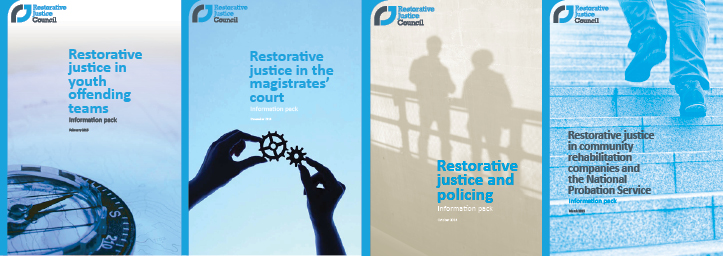In this Clinks Guest Blog, Jon Collins from Restorative Justice Council talks about a series of information packs designed to help increase the use of restorative justice within the Criminal Justice System.
In the past decade, restorative justice has moved into the mainstream of the Criminal Justice System. In a time of great upheaval, we have seen the use of restorative justice increasing in youth offending teams, police forces and probation services across the country as well as the introduction of new legislation which means that it can be used at all points within the criminal justice process. At a time when budgets are being cut, this is testament to the strong support restorative justice has secured. We have seen a broad consensus developing in favour of restorative justice from across the political parties as well as among academics, practitioners and the public.
The benefits of restorative justice are well known by now. It gives victims the chance to meet or communicate with their offenders to explain the real impact of the crime - it empowers victims by giving them a voice. It also holds offenders to account for what they have done and helps them to take responsibility and make amends. Government research demonstrates that restorative justice provides an 85% victim satisfaction rate, and a 14% reduction in the frequency of reoffending.
But despite this broad agreement that restorative justice works for victims and offenders, too few criminal justice professionals have a firm understanding of what restorative justice involves, at which stages in the criminal justice system it can be used, and how to ensure that it is provided to the highest quality.
Restorative justice, then, is an important and valuable process which can be used to deal with crime effectively. But it is a process that is under-utilised and often misinterpreted. It is in this climate that the Restorative Justice Council have published a series of four information packs to help criminal justice professionals to understand the benefits of restorative justice and make greater use of it within their work. This will give more victims and offenders the chance to take part in this valuable process.
The series consists of information packs for magistrates, youth offending workers, police, and workers in the new probation landscape. The packs have been developed with the help of the Ministry of Justice as well as a number of other agencies.
The information packs include useful information on the restorative process and frequently asked questions. But we feel the best way to demonstrate the impact that restorative justice can have is to hear from those who have taken part in the process themselves. This is why the packs include powerful accounts of restorative justice in action. There are stories from victims of burglary and sexually harmful behaviour who have found that restorative justice gave them a voice in a process which all too often marginalises victims. Also featured are accounts from offenders who have found that restorative justice confronted them with the impact of their actions and helped them to move forward with their lives.
All four packs are useful for those new to the concept of restorative justice as well as those already implementing it within their work who want to read about the latest thinking within the field.
More information and links to the packs can be found here: www.rjc.org.uk/infopacks
What's new
Publications
Latest on X
The role is for a leader from an organisation focused on racially minoritised people, with expertise in service delivery, policy, advocacy, or related areas in criminal justice. Racial disparities are present at every CJS stage. This role ensures these voices are central in shaping policy to help address and eradicate them. Apply by Mon 18 Nov, 10am. More info: https://www.clinks.org/voluntary-community-sector/vacancies/15566 #CriminalJustice #RR3 #RacialEquity


